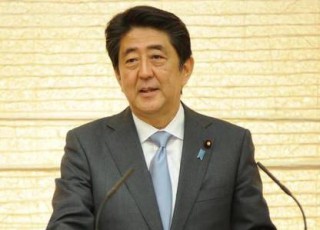Loading
Search
▼ Abe Has Chance to be Japan's Longest-ruling PM After Rule Change
- Category:Other
TOKYO — Japanese Prime Minister Shinzo Abe has a chance to stay in power through the 2020 Tokyo Olympics and become the country’s longest-ruling leader after his party decided this week to allow its presidents to serve a third straight three-year term.
The rule change by Abe’s Liberal Democratic Party could give Abe a better chance to achieve his controversial goal of revising the post-war pacifist constitution, revered by some as a beacon of democracy but seen by many conservatives as a humiliating symbol of Japan’s defeat in World War Two.
Abe took office for a rare second term as prime minister in December 2012, promising to reboot a stale economy and bolster defence. He is now serving a second consecutive term as LDP president, which ends in September 2018.
LDP rules now cap the presidency at two consecutive three-year terms. The rule change to allow a third term must be formalised at an LDP convention set for March next year.
Japanese prime ministers are elected by parliament’s lower house and therefore are members of the majority party or a ruling coalition party.
If Abe wins reelection as LDP head and his party remains in power, he could stay on as prime minister into September 2021, which - combined with his 2006-2007 tenure - would make him the longest-serving leader of a country accustomed to a revolving door of short-term prime ministers.
“It is certain the environment would be created for him to settle down and tackle long-term issues such as revising the constitution,” said the conservative Yomiuri newspaper in an editorial.
Abe’s reelection as party president, and hence prime minister, two years from now is hardly a done deal.
His popularity has remained mostly robust - a September Yomiuri survey put it at 62% - and the main opposition Democratic Party is languishing in public opinion polls.
But voters were split on the desirability of extending Abe’s term as LDP chief, with 48% in favor and 43% against.
Doubts persist as to whether his “Abenomics” recipe for revving up the economy with hyper-easy monetary policy, spending and promised reforms is working. The same survey said 55% did not expect the economy to improve under his administration.
Some critics worry that with opposition parties weak and LDP members willing to speak against Abe few and far between, governance could suffer from a lack of checks and balances.
“A lack of competition can lead to complacency and good governance would possibly be in danger,” said Sophia University professor Koichi Nakano.
If Abe lasts until late 2021, he would have served longer than early 20th century premier Taro Katsura and than his great-uncle, Eisaku Sato, Japan’s longest-serving post-war prime minister.
(c) Copyright Thomson Reuters 2016.
- October 31, 2016
- Comment (0)
- Trackback(0)


